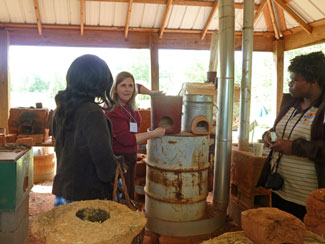 |
| UAB faculty took visitors from Zambia to Lineville to learn about Servants in Faith and Technology, a Christian nonprofit organization that provides training in self-help programs in needy areas of the world. |
Lynda Wilson, Ph.D., assistant dean for International Affairs, is coordinating the collaboration among the Sparkman Center for Global Health, UAB schools of Public Health, Health Professions and Medicine, Samford University McWhorter School of Pharmacy and University of California, San Francisco. The program is funded by a grant awarded by the U.S. State Department Bureau of Educational and Cultural Affairs to UAB in 2010.
The first 12 visitors under the program spent two weeks on campus in May learning to address health needs of populations with the greatest needs for care. The Zambians spent another two weeks paired with faculty advisors at UAB and the McWhorter School of Pharmacy, and fellows from Malawi were paired with faculty advisors at UCSF.
Nurses, physicians, pharmacists and physiotherapists were among those who learned about public health organizations and advocacy groups that serve culturally diverse urban and rural communities, and they worked with faculty advisors to establish learning goals. “They could observe classes, go to clinical facilities, learn about teaching resources and set up a plan for our faculty visits to their country,” Wilson says.
“They’re very positive about the experience,” Wilson says. “They’re seeing things with new eyes. They were especially eager to learn about our simulation lab. They have one they’re developing and expanding. We’re equally excited about the opportunity this provides our faculty too.”
The program is bi-directional, which means faculty from the UAB will visit Zambia and Malawi to learn firsthand the challenges their contemporaries face daily and stay in their colleagues’ homes when they travel.
| The program is bi-directional, which means faculty from the UAB will visit Zambia and Malawi to learn firsthand the challenges their contemporaries face daily and stay in their colleagues’ homes when they travel. |
Visitors from Zambia and Malawi stayed in the homes of UAB faculty or other volunteers while here.
Wilson and her husband Craig Wilson, M.D., professor of epidemiology and director of the Sparkman Center for Global Health, housed two of the Zambian faculty. Craig Wilson, who has worked in Zambia as part of UAB’s Centre for Infectious Disease Research (CIDRZ) and in other capacities since 1998, says the opportunity for personal interaction strengthens the learning opportunities.
“It’s really a fantastic way to promote cross-cultural understanding,” Craig Wilson says. “You have an opportunity to have real personal interaction, and I think a lot of value comes with that.”
Lynda Wilson agrees. The Monday morning after the visitors spent their first weekend with host UAB faculty, she asked each of the visitors to share their weekend experiences.
“One woman said she learned to drive a tractor because her host family lived on a farm,” Wilson says. “Another man, who is an obstetrician, said he saw couples work together to complete various chores and reported that in Zambia, the woman does most of the cooking.”
The program also promotes cross-cultural understanding through visits the cohort made to public health organizations and advocacy groups that serve disadvantaged urban and rural communities.
The group spent one day in Lineville at Servants in Faith and Technology (SIFAT), a Christian nonprofit organization that provides training in self-help programs in needy areas of the world; SIFAT has partnered with UAB on efforts around the world, including in Zambia.
The visitors also spent a day in Perry County with the non-profit Sowing the Seeds of Hope, where they saw that group’s work to provide care to underprivileged areas in Alabama.
“We wanted to show them the high tech we have, and we wanted to show them that Alabama has poverty, too, and we find ways to reach out and help those in need,” Lynda Wilson says.
A second cohort from Zambia and Malawi will come to UAB this fall.
History of collaboration?
The program also will open doors for collaboration for reciprocal fellowships and promote sustainable partnerships between key professional groups in these countries.
Wilson also is hopeful students will be a part of the learning.
The group is devising at least four learning opportunities for students that will involve the participating universities of Malawi and Zambia plus UAB, Samford and UCSF.
Wilson hopes students can use the Internet to collaborate on case studies and bridge medicine, pharmacy, nursing and community health to develop solutions to hypothetical cases.
Wilson says the students should be able to learn and teach each other. “It’s a way to break down barriers and think with a larger world view that just Alabama. We’ll see what happens after our faculty travel there in a few weeks.
“Hopefully new ideas will emerge on how we can keep working together. That’s the vision.”
